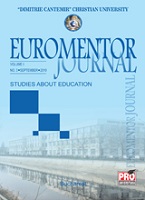ACTIVE LEARNING AND A GOOD RELATIONSHIP WITH STUDENTS – THE FOUNDATIONS OF FACILITATING LEARNING
ACTIVE LEARNING AND A GOOD RELATIONSHIP WITH STUDENTS – THE FOUNDATIONS OF FACILITATING LEARNING
Author(s): Monica Licu, SORIN PĂUN, CLAUDIU GABRIEL IONESCUSubject(s): Higher Education , Educational Psychology, Management and complex organizations, Sociology of Education, Pedagogy
Published by: Editura Pro Universitaria
Keywords: active learning; pedagogical methods; teacher-student relationship; learning facilitator teacher;
Summary/Abstract: The article’s aim is to review the main factors which contribute to an optimal teacher-student relationship using active learning. We overview how the effectiveness of a teacher is not his personality structure, but the relationship he establishes with students, as well as the pedagogical methods used. The teacher-student relationship is one of the most important factors for learning. The learning facilitator teacher, as opposed to the one who only transmits information, helps students to learn skills by themselves and to develop critical thinking by involving them in a personal process outside the course when they process texts related to the course. To counteract the progressive deterioration of students' attention, the effective teacher will introduce something original every 15 minutes. Basically, instead of a 50-minute lecture, he will introduce 3 mini-lessons of 15 minutes integrated by a pedagogical activity that changes the rhythm of the presentation. Working in a team, framing clinical contexts, theatre techniques and problem- and project-solving learning are reviewed from several studies examined. The students are as often as possible in the role of actors involved in the educational process, thus favouring active learning, which involves more than just listening and gives them the opportunity to explore their own ideas, attitudes, beliefs related to the topic studied. In conclusion, while revisiting the limits of active learning we emphasize that a relationships based on honesty, mutual respect and emotional involvement between teachers and students is essential to the effectiveness of education with clearly defining of learning objectives the success of active learning and its benefits mentioned above could be easily achieved.
Journal: Euromentor Journal - Studies about education
- Issue Year: XIII/2022
- Issue No: 4
- Page Range: 45-57
- Page Count: 13
- Language: English

